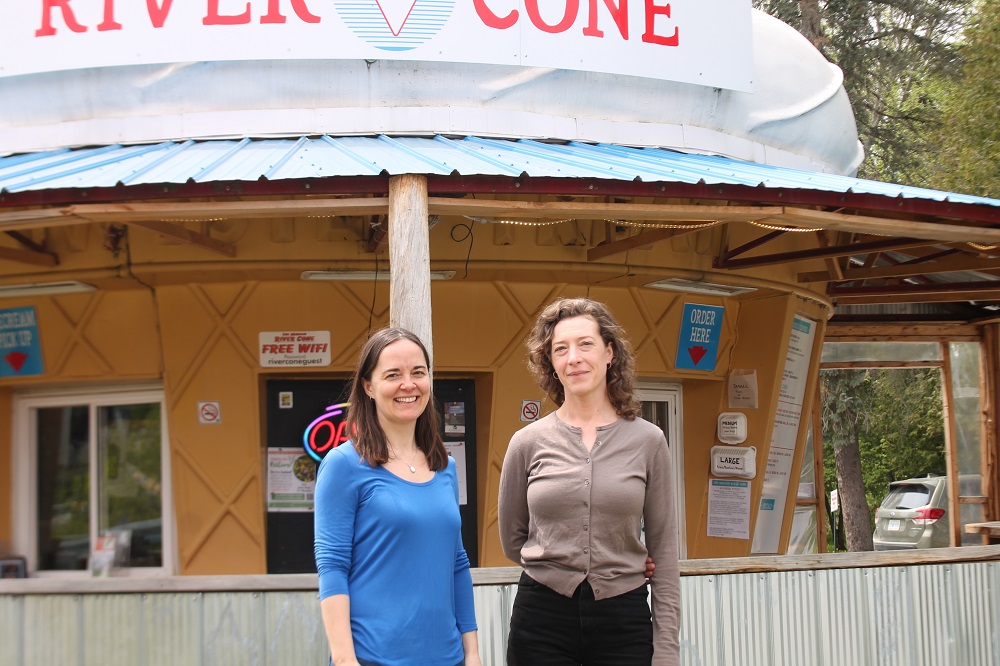If you live in Minden, chances are you’ve seen Dionne Pohler and Leticia Chapman around town.
Pohler, a University of Saskatchewan faculty member, and Chapman, a PhD student from the University of Alberta, have been chatting up locals for a research project on rural Canadians.
Pohler explained they’ve been inspired by the work of Katherine J. Cramer, the author of The Politics of Resentment: Rural Consciousness in Wisconisn and the Rise of Scott Walker. She delved into why Democratic Wisconsin turned Republican in 2016, and the mood of rural and smalltown America.
Cramer’s work focuses on the way people in the U.S. make sense of politics and their place in it. But. instead of relying on polls and surveys, she dropped in on informal gatherings, such as coffee shops, and gas stations, to listen in on what people were saying.
Pohler said as a result, Cramer, “had probably the most compelling explanation for what had happened, and what people were upset about because she was actually coming and talking to people in rural communities.”
She added when it comes to social science research, academics tend to live in cities, which means, “we’re doing research that doesn’t get a sense of what happens outside of the large urban areas. Canada’s urbanizing and a lot of the research is survey-based or opinion research, polling, and that kind of thing. You don’t really get a feel for how people make sense of issues, what they care about, why they care about it, and how they make sense of issues together in groups.”
Pohler got a grant from the Social Sciences and Humanities Research Council to study rural Canadians, and Chapman is her research assistant. Pohler’s collaborator is Clark Banack, the director of the Alberts Centre for Sustainable Communities.
“We’re starting to spend two weeks in every rural community we visit and try and get a sense of the place and the people. What do they care about? How do they make sense of issues? Why do they care about the issues they care about?”
She said they come without an agenda, and just see what presents in a community. In this instance, it’s the closure of the Minden ER.
They’ve picked up on the seasonal nature of the County, too, as well as a movement towards self-sufficiency and homesteading.
“I think people in urban centres, or in general, think rural communities are not diverse, thriving places, and you show up in them and you’re like, ‘wow, they are’,” Pohler said.
Other observations they’ve made is that people might have different opinions but generally get along.
When they are done their research, Pohler said it may turn into a book. They will definitely publish academic papers, but would like their findings to be more accessible to the general public, including the communities they are visiting.
Pohler said it’s been eye-opening since most of her research is statistics and datadriven. “I have to say there’s something interesting about just letting people tell you why they think and believe the things they do in their own words.”
Chapman added, “when we’re debriefing after we’ve talked to somebody, is people in small communities don’t necessarily expect other people to be totally coherent. You can have this opinion, and you can have that opinion, and it doesn’t matter what’s kind of related to that. Sort of a bit of pragmatic tolerance.
“When I decided to go back to university and start a PhD, I wanted to write about rural communities because I wanted to research them and find a way to talk about this in a different way because what I was seeing was really complex and interesting. Basically, people finding ways to get along with each other. I’ve always seen rural life in small communities being much more socially complex.”
Pohler added, “maybe we don’t have as many competing values as we think when it comes down to it. It’s about relationships. You care about interacting with somebody and you don’t walk away because it’s a difficult conversation.”
Dionne Pohler and Leticia Chapman conducted research in Minden.





